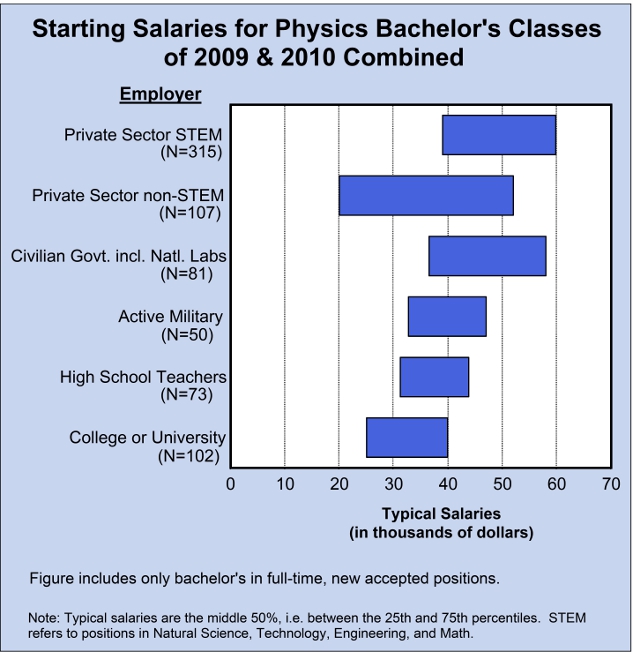Table of Contents
Physics as a Career
Physics is the study of the structure of matter and space and time. Because it is so fundamental, physics is required for a basic understanding of all other sciences, and for all technology. Astronomers trying to understand the global structure of the cosmos, or the first few millionths of a second after the big bang, are totally dependent on physical theories about the nature of space, time and matter. Biologists who are trying to understand the way genetic information is coded in DNA need the techniques that physicists have developed in their studies of molecular structure. Computer engineers who try to build ultra-small memory storage systems rely on our understanding of physics at the quantum level. Every aspect of our scientific understanding, and all our technological advances, are based on fundamental physics discoveries.
We have determined the structures of nuclei, atoms, molecules and other forms of condensed matter. However, many fundamental discoveries are yet to come. For example, we still do not understand how to unify the theory of gravitation with quantum mechanics. Until we do, we will be unable to understand the very early history of our universe, or the nature of extreme states of matter such as black holes. Until we have more knowledge of the masses and structures of elementary particles, we will not know whether our universe will continue to expand indefinitely, or whether it will collapse back to a state of enormous density. High-temperature superconductivity is still not understood. Physics continues to offer us great intellectual challenges, and the prospect of another century of exciting discoveries.
Because the role of physics is so widespread, an understanding of physics and the methods used by physicists has very wide applications. Thus training in physics is an excellent foundation for further work in any science or technology. Students who have completed an undergraduate degree in physics can go on to careers in research, industry, education, medicine, engineering, business, and law.
Usually research-oriented students get further training at the graduate level, either in physics or in some other science or technology. They then take jobs in teaching and research at colleges or universities, or in governmental or industrial research institutions. Other holders of physics degrees go directly into jobs in science-related industry or business. Employers realize that a student trained in physics not only has a good understanding of the way the physical universe operates, but this student has also learned how to use this understanding to devise fresh approaches to new problems. In addition, physicists know how to relate theoretical reasoning to empirical facts.
In order to make it easier for students to follow their undergraduate physics degrees with careers in engineering, biology or education, the Physics Department has introduced alternative paths to a physics degree, in addition to the traditional “pure physics” path. A student who follows one of these alternative paths takes a set of core courses and labs, but is also able to do enough work in his or her chosen area of specialization to be prepared for post-graduate work in that area. Students interested in teaching physics in high school should consider graduate study in the College of Education to complete the requirements for teaching, after finishing a Bachelor of Physics degree.
Resources
For students pursuing a physics bachelor degree with the intent of going to graduate school, gaining experience in a research lab is invaluable, and should indeed take precedence. For students pursuing a bachelor degree with the intent of going into industry, however, an internship will expose you to particular types of work, give you valuable work experience, connect you with people already working in industry, and will afford you the opportunity to explore different types of work before your job search begins.
Take advantage of the The Career Center for Science and Engineering throughout your program, from choosing a major to landing your first job.
GoldPASS is the U of M's online database to help connect students and alumni with employers, volunteer organizations, and internships across the country. Students can post their resumes; view and search jobs, internship, and volunteer listings; register for career fairs; and schedule interviews.
The U of M's employment opportunities website lists jobs around campus. Check here for opportunities that may be of interest to you.
The School of Physics and Astronomy also posts job opportunities within the School online.
Employers in Minnesota that recently hired physics bachelor recipients
3M Accenture Aerosim Technologies, Inc. AmeriCorps Avant Energy Services Banner Engineering Corporation Boston Scientific Celadon Systems, Inc. Environ Laboratories, LLC Envoy Medical Corporation EXB Solutions, Inc. Graco Heidelberg Instruments, Inc. Homeworks for Students, Inc. Innovox Audio Intelligent Automated Machines, Inc. Lake Region Medical Medtronic MEI Research, Ltd. Northwest EMC Pace Analytical Services, Inc. PictoSnap, LLC Power/Mation Project Resources Corporation Seagate Technology Securian Financial Group Soligie, Inc. Systems Management and Balancing of MN Telecom Engineering, Inc. US Bank Vascular Solutions, Inc. Vixar, Inc. Volt Information Sciences
This is only a portion of the employers who hired recent physics bachelors into technical positions.
Source: AIP Statistical Research Center, Initial Employment Surveys
Starting Salaries for Physics Bachelor's
Source: AIP Statistical Research Center
